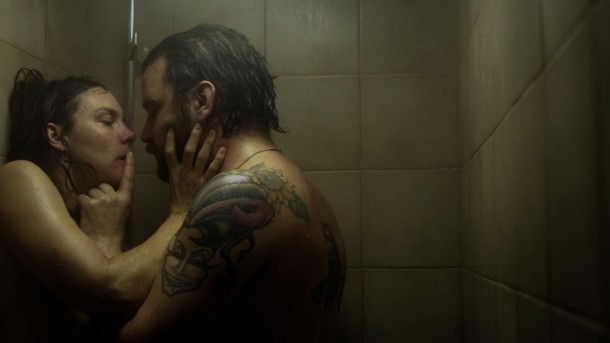
Director: Sasha Polak Writer: Helena van der Muelen
Cast: Barry Atsma, Martijn Lakemeier, Wende Snijders, Sascha Alexander Gersak
89min Drama Dutch
Physically and emotionallly raw after the death of her lorry-driver boyfriend, a woman struggles to come to terms with her life as she wanders inconsolable through the highways and byways of central Europe
ZURICH is Sasha Polak’s follow-up to Hemel, her curiously-named debut that focused on a young woman’s frank exploration of sex. Collaborating again with screenwriter Helena van der Muelen, this non-linear narrative runs in a similar vein to Hemel but although billed as a feminist feature, ZURICH nevertheless sees its central character (Nina, played by a Frances McDormand-like Wende Snijders) seeking immediate sexual and emotional support from random trucker Mathias (Sascha Alexander Gersak), after a series of abortive and violent sexual encounters on the motorway. Her unstable behaviour can be partly explained by the disturbing nature of her bereavement and is rendered in vivid flashbacks to intimate times with her lover and are an inevitable corollary to the shock at losing his so abrubtly and in such traumatic circumstances (…in a village called Zurich). From a surreal opening scene involving a cheetah, Polak creates a strikingly evocative and occasionally dreamlike narrative with limpidly cool then resplendent florid visuals lensed by Frank van den Eeden and Rutger Rijnders’ judicious sountrack of electronic and medieval choral pieces that brilliantly evoke the exquisite pain and passion of Nina’s emotional arc. The first part of the film ends abruptly with another roadside tragedy that allows her to vent pent-up emotions.
In ‘Part Two’ , we meet a more equable Nina that flashes back to the past in the immediate aftermath to Boris’ death and Polak introduces various characters whose identities remain a mystery: a child and several adults who could be her family, although this is not clear. There are also some aspects to the plotline which appear fuzzy and inconclusive and although at times the tone veers into high melodrama this does feel in keeping with the highly visceral quality of Nina’s emotional landscape after being left sexuality and physically high and dry in horrific personal circumstances. As such, ZURICH works best as a post-traumatic character study which is convincingly and voluptuously fleshed using the full spectrum of senses convincing reflecting extreme anguish from a woman’s point of view. Polak, van der Meulen and Snijders clearly have a promising and exciting career ahead of them. MT
ZURICH SCREENS AT THE CAMBRIDGE FILM FESTIVAL 3 -13 SEPTEMBER 2015